
Tamara Paltin, Shane Sinenci and Yuki Lei Sugimura
The Sixth in a Series.
Editor’s note: In 2022, Leadership for the State and Maui County will be at the forefront with elections for Governor, Maui Mayor, Council, and due to reapportionment, all State Senators and State Representatives. The primary election will be held on August 13, 2022 with the General Election on November 8, 2022, and it’s not too early to start thinking about the type of State and County leaders needed. Our first series focused on potential gubernatorial candidates. We now shift our focus to our County’s elected leaders, who were simultaneously sent identical questions with the same response date. In November, we focused on Mayor Michael Victorino and we shift our focus to the current members of the Maui County Council. In December, we focused on Councilmembers Gabe Johnson, Tasha Kama and Michael Molina. This month, we focus on Councilmembers Tamara Paltin, Shane Sinenci and Yuki Lei Sugimura. Councilmember Kelly King, Council Chair Alice Lee, and Councilmember Keani Rawlins-Fernandez did not timely respond.
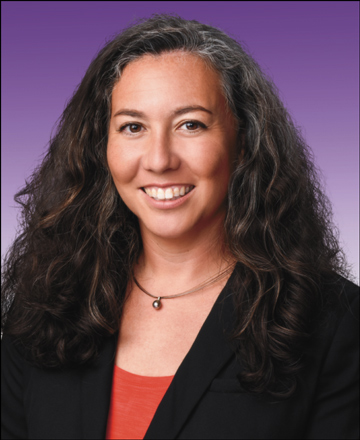
Tamara Paltin
1. In 100 words or less, please tell us your background, including details about your family, education, and experience in the public, private, and non-profit sectors.
I am currently serving my second term on the Maui County Council. I was born and raised here in Hawai‘i nei, and my husband George Vierra and I are raising our two children here in Nāpili. Prior to taking office, I worked as an Ocean Safety Lieutenant at DT Flemings Beach Park. I’ve earned a Bachelors of Science in Mathematics and Education and have chaired the Council’s Planning and Sustainable Land Use committee since taking office in 2019. I have also been a member of all the council’s committees since 2020 and a member of Maui’s Metropolitan Planning Organization.
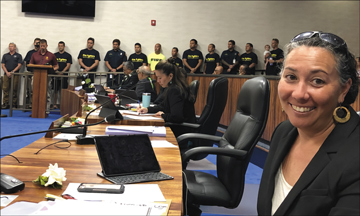
Photo courtesy Tamara Paltin
2. In 200 words or less, please tell us: a) What is your vision for Maui? b) What is right with Maui? c) What is wrong with Maui?
A. My vision for Maui County is that we are a resilient and sustainable County; able to weather storms, climate change and economic setbacks and bounce back together, better and stronger than before. I want to see all our residents be able to own a home, pursue a higher education or be able to pursue their dreams here in Maui County. B. During times of hardship, as a County we pull together and take care of one another. We are moving to diversify our economy through agriculture and innovation and as a County we give a lot to our non-profits that assist in raising the standard of living for those in need. We work hard to protect our environment and resources and balance the need for development. C. Despite our efforts, we are over dependent on tourism, home ownership is unattainable for most residents and we are short of critical workers such as doctors, nurses, police and teachers. We have limited mass transportation options and the Jones Act contributes to making the cost of living too high for most residents.
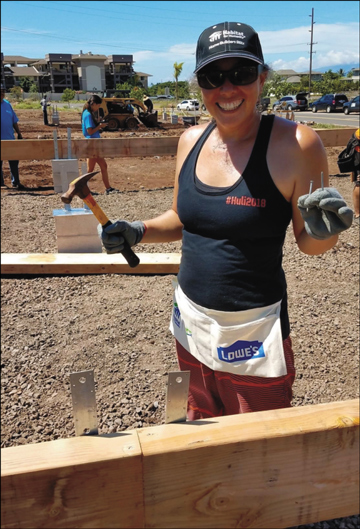
Photo courtesy Tamara Paltin
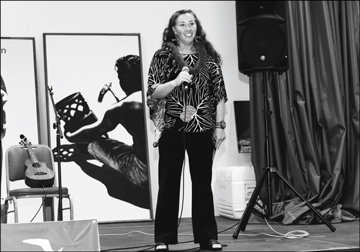
Photo courtesy Tamara Paltin
3. In 125 words or less, please describe your relationship with Maui’s Filipino community.
My mother’s family came to Hawai‘i several generations ago to work on the sugarcane plantations. My mother was raised on Hawai‘i Island, ‘Amauulu Camp 5 during World War II and worked at the Pineapple cannery in Honolulu to put herself through college. I am not Filipino, but I grew up going to school, working and spending time with many Filipino community members as friends. I share plantation roots with many of Maui’s Filipino community and a love of the culture, work ethic and commitment to education.
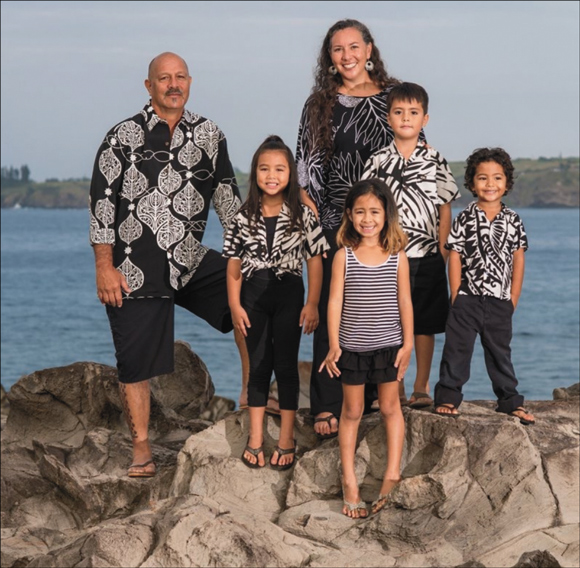
Photo courtesy Tamara Paltin
4. In 500 words or less, please identify and explain the three greatest needs of Maui’s Filipino community.
The three greatest needs within the Filipino community are affordable housing, better paying jobs and access to higher education opportunities. I believe Maui’s Filipino community is greatly undervalued. So many Filipino members of our community work more than two jobs and live in overcrowded housing situations. Although many Filipino work multiple jobs, they are often low paying jobs. This fulfills a critical need, but decreases quality of life, time spent with family, rest and pursuing other interests for the workers. More and better access to higher educational opportunities can allow Filipino youth as well as adults, to get higher paying specialized jobs in a variety of needed fields (Medicine, law enforcement, caretaking, etc). We need to create space to allow our youth to try out different career paths that can lead to better paying jobs which can in turn make home ownership a reality. Maui County does invest in Maui Economic Development Board which expands opportunities for school aged youth. The County also funds Maui Economic Opportunities, which has a Core 4 business development program that can help adults who have an idea and want to become small business owners. Our Filipino community needs leadership to encourage their involvement in attaining higher education and support to obtain good paying jobs that they are interested in and that help to forward the goals of Maui County as described in Maui’s General Plan. Across the board, affordable housing is the most critical issue facing Maui community members, including Filipino’s. Demand far exceeds supply and there are so many people from outside of Hawai‘i buying properties with cash and above the asking price. We have a number of affordable/workforce housing projects coming up and these rental projects can offer lower rents for families to save up towards home ownership. Hale Makua, Nā Hale o Maui and Hawaiian Community Assets, and others, have programs open to all Maui County residents to help get them on track to home ownership. I encourage the Filipino community to take advantage of these programs designed for all our residents to help them apply and qualify for loans and improve their credit score to get them home ready when the opportunity arises.
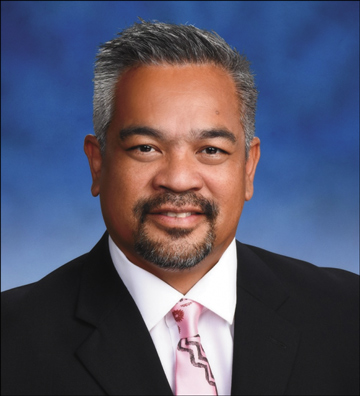
Shane Sinenci
1. In 100 words or less, please tell us your background, including details about your family, education, and experience in the public, private, and non-profit sectors.
Mabuhay! I was born and raised in Hāna to Stephen Sinenci Sr. and Gladys Roback. I attended Lahainaluna High School as a boarder, and later received a Bachelor of Architecture from the University of Oregon. Upon returning to Maui, I taught at Hāna High and Elementary School as a special needs teacher for 20 years. Since being on the Maui County Council, I have worked on Environmental issues and Cultural preservation efforts. I currently chair the Agriculture and Public Trust committee and am working on the Water Use Development Plan and the new Agriculture Department.
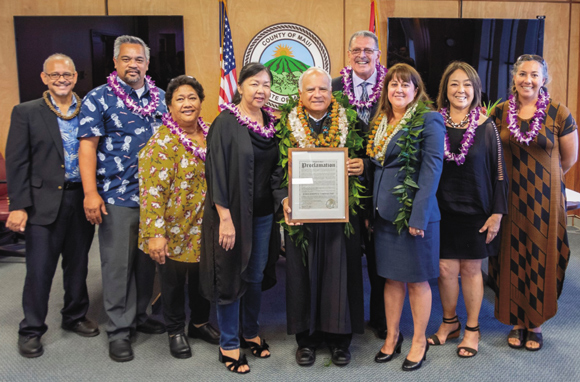
Photo courtesy Shane Sinenci
2. In 200 words or less, please tell us: a) What is your vision for Maui? b) What is right with Maui? c) What is wrong with Maui?
Maui County is a special place for both residents and visitors. It has a rich agricultural history where many of our ancestors worked in the sugar and pineapple plantations. The cost of living in Maui can be quite expensive, particularly when we depend on 90 percent of imported goods from the US mainland. A new Department of Agriculture will greatly improve our food security on the island, by keeping important agricultural lands for food production and developing the infrastructure to process food products on the island. Our predecessors survived on every aspect of farming, and diversified agriculture will create plant by-products, more economic opportunities for value-added products, and a chance to bring food costs down.
Our visitor industry is an important economic driver that we want to manage and sustain because over-tourism can quickly overwhelm us beyond our control. It is important that the rental car industry does not overwhelm our roadways and highways, that our beaches are open to all users, and that short-term rentals do not over-run our local neighborhoods. Other mainland communities are experiencing over-tourism and it is important that we manage our visitors’ footprint upon our precious island environment.
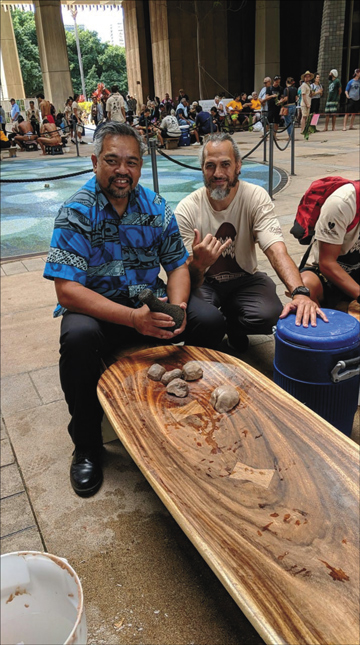
Photo courtesy Shane Sinenci
3. In 125 words or less, please describe your relationship with Maui’s Filipino community.
My grandfather, Blas Dadoy Sinenci, was one of the first sakadas to Hawai‘i. He came in 1931, from Pinili, Ilocos Norte, to work on the sugar plantation. He ended up at the Kīpahulu Sugar plantation where he met and married my grandmother Martha Tolentino. Papa Blas was a true farmer, he sold his bananas to the plantation neighborhoods and lived off of his garden of sweet potatoes. He fathered 9 children, 7 sons and 2 daughters, of which his eldest Stephen was my dad. My uncles all became workers in the construction industry, including contractors, masons and landscapers but farming was a labor of love. My family instilled in me the ethics of hard work and family; all Filipino values that Papa Blas taught us.
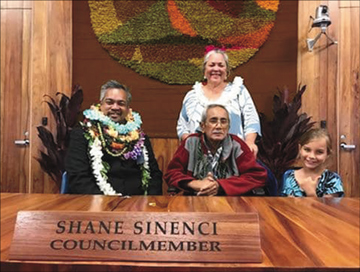
Photo courtesy Shane Sinenci
4. In 500 words or less, please identify and explain the three greatest needs of Maui’s Filipino community.
Maui County’s Filipino community provides us with a rich culture and a sustainable workforce. The contributions to our communities are enormous, including military service, political office and vital frontline workers during the pandemic. Our Filipino history in Hawai‘i spans over 100 years! And although Filipinos provide a vital workforce for our agriculture, hotel, and medical industries, more investments into these industries are important in expanding the pamayanan. The Coronavirus pandemic has reminded us that our medical services are crucial in keeping our island community safe and healthy. Many nurses are being imported into the state to meet the demands of ICU patients and we must utilize our training institutions on the island so we can provide workers locally. It is also important that our established Filipino businesses support our young mga bata, into professional careers including law, medicine, dentistry, and consulting.
The visitor industry is one of Maui County’s most lucrative economic drivers, however, millions of dollars are being shipped off-island to offshore investors. In order to keep families at home and to establish wealth opportunities here, our local families should look to acquire condominium properties within commercial zones and invest in the short-term rental business; or at least to purchase for long-term housing options. Finally, if anybody can be characterized as a resilient people, it is Filipinos. We have proven that sustainable living is an important cultural value and one that the entire County can learn from. As we invest in food security on the island, growing and processing food will be important diversified businesses to promote in the coming years. Filipino food is a favorite amongst all island cultures and promoting the culture through food is imperative.
In closing, I look forward to more dialogue with the Filipino community and in supporting Filipino-American Heritage in all facets of our daily lives. Maraming Salamat!
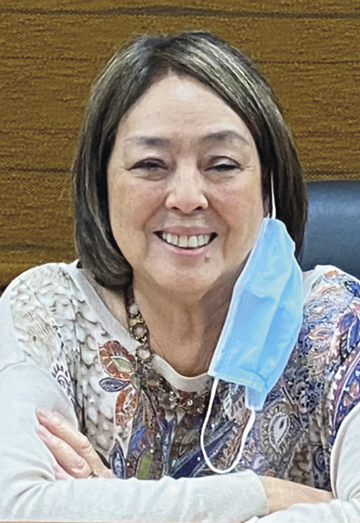
Yuki Lei Sugimura
1. In 100 words or less, please tell us your background, including details about your family, education, and experience in the public, private, and non-profit sectors.
Maui born, raised sugar plantation, Baldwin graduate, UH Mānoa, Bachelor of Science degree, wife 35 years, mother, three term Councilmember, businesswoman, Democratic Party Maui Vice Chair. Maui County Representative for U.S. Senators Daniel K. Akaka and Mazie Hirono. Advocated on COVID-19 eviction moratorium program which shared sources for financial support. Volunteered COVID-19 food-box distribution at the Binhi At Ani Filipino Community Center, 2021 MEO Kūpuna Advocate of the Year awardee, 2019 M.A.U.I. (Making An Unforgettable Impact) Kanaktion Community Leader Award for Prevention of Under Age Drinking. Board member Maui Filipino Chamber of Commerce, Maui Nisei Veterans Memorial Center and Japanese Cultural Society of Maui.
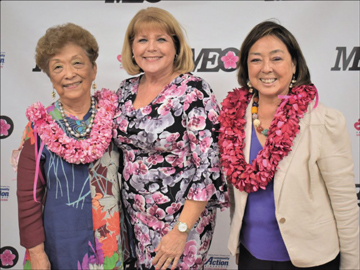
Photo courtesy Yuki Lei Sugimura
2. In 200 words or less, please tell us: a) What is your vision for Maui? b) What is right with Maui? c) What is wrong with Maui?
My hopes and dreams for our residents is to have a roof over their heads with comfort and safety, children who are educated with hopes and dreams towards the future. As the County Council Infrastructure and Transportation Committee chair I am working with the County Departments to build the Central Maui wastewater system and the Wai‘ale Road extension. Both these projects will support housing, jobs including long term agriculture, schools and private, public services in the Central Maui area. Also by building the wastewater system, it will begin to address the decentralization of the Kahului wastewater treatment facility which may be impacted by climate change and future sea level rise.
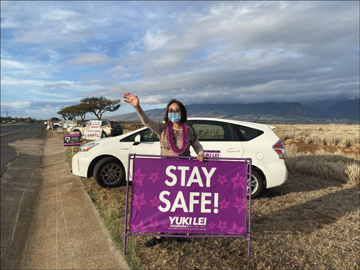
Photo courtesy Yuki Lei Sugimura
What is right about Maui is we care about each other as displayed by the Filipino community during COVID-19 pandemic. The Binhi At Ani Center provided food-box distribution; vaccinations and lifted the community. I was fortunate to volunteer and even donated rolls of toilet paper for distribution. Also I was impressed with the Filipino community scholarship awards and recognition of business leaders. This is absolutely right for the people!
The difficulty of Maui is the cost of living and living on an island with limited available land to build homes and communities.
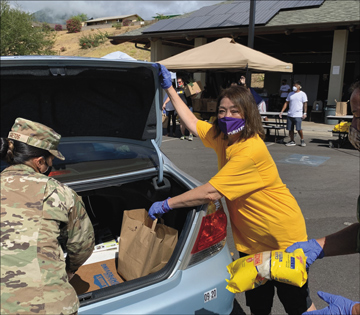
Photo courtesy Yuki Lei Sugimura
3. In 125 words or less, please describe your relationship with Maui’s Filipino community.
I treasure the Filipino community and try to volunteer and participate with the many community activities from the various Filipino organizations. At one of the food drives during the pandemic, a gentleman who I was packing food boxes with asked me if I was Filipino. That was a treasured moment and I felt in my heart that although I am not of Filipino ancestry I could possibly be a part of the Filipino community.
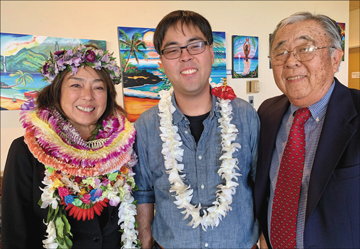
Photo courtesy Yuki Lei Sugimura
4. In 500 words or less, please identify and explain the three greatest needs of Maui’s Filipino community.
The greatest need for every community on Maui is an affordable home to purchase or rent. Homes are being swept off the market and taking away the opportunity of the American dream from our local families. There is also a shortage of homes which drives-up the cost of housing and it becomes unattainable for working families. In my role as Councilmember, I am working on legislation for tiny homes to maybe provide some additional options for housing.
The next greatest need is to earn a living wage to save money and live a sustainable and balanced life.
The last greatest need is to send our children to college as education is the key to attain bigger dreams and wishes.
